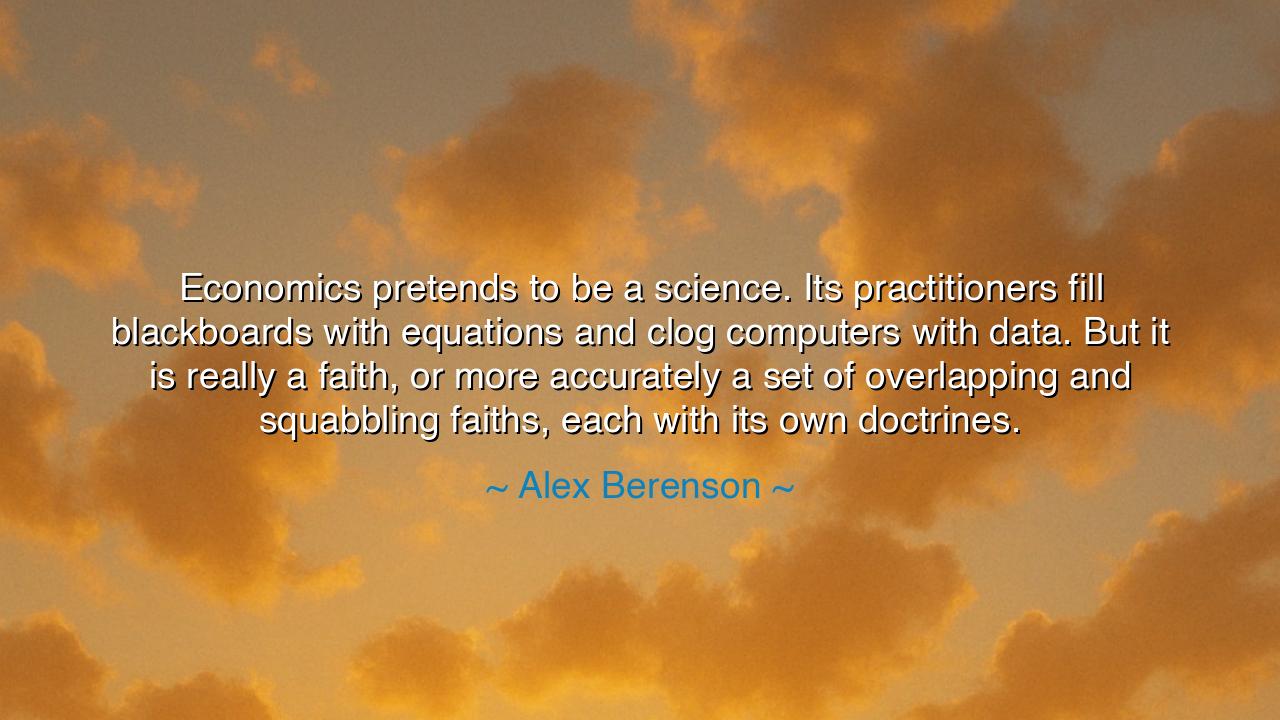
Economics pretends to be a science. Its practitioners fill
Economics pretends to be a science. Its practitioners fill blackboards with equations and clog computers with data. But it is really a faith, or more accurately a set of overlapping and squabbling faiths, each with its own doctrines.






In the age when numbers reign and charts are treated as holy writ, Alex Berenson spoke with a voice both sharp and discerning: “Economics pretends to be a science. Its practitioners fill blackboards with equations and clog computers with data. But it is really a faith, or more accurately a set of overlapping and squabbling faiths, each with its own doctrines.” His words pierce the illusion of objectivity that cloaks modern thought, reminding us that beneath the surface of precision and prediction lies something profoundly human — belief, conviction, and the eternal struggle to make sense of uncertainty. For though economists wrap their arguments in the robes of mathematics, they cannot escape the truth that economics, at its core, is not an exact science but a mirror of the human heart — filled with hope, fear, and bias.
The origin of these words lies in Berenson’s work as a journalist and thinker who observed the machinery of markets and the philosophies that drive them. In his time, as in ours, the world had come to worship data as the new oracle. Economists, armed with equations and computers, claimed to predict the tides of prosperity and recession, as if human behavior could be charted like the path of planets. Yet Berenson saw the cracks in this illusion. For every theory of supply, there was a counter-theory of demand; for every model predicting growth, another forecasted collapse. Like ancient priests arguing over the stars, economists quarreled over invisible forces — inflation, consumption, debt, value — each interpreting the unseen according to their own creed.
His insight recalls the wisdom of the ancients, who knew that human affairs could never be reduced to numbers alone. In the marketplace of Athens, long before computers and graphs, traders and philosophers alike understood that wealth was as much about confidence and trust as it was about coins. Even Aristotle, one of the greatest minds of reason, warned that economics was inseparable from ethics, and that any study of value divorced from virtue would lead to ruin. Berenson’s lament is thus an echo of that ancient warning — that when we mistake calculation for truth, we lose sight of the soul within our systems.
History has proven this truth again and again. Consider the Great Depression of 1929, when the world’s leading economists, confident in their models, failed to foresee the collapse of the global order. They believed in the eternal rise of markets, as though growth were a law of nature. But when the illusion shattered, millions suffered, and the equations that once inspired confidence became symbols of folly. Or look to the financial crisis of 2008, when the most powerful institutions of modern finance — guided by complex algorithms and so-called scientific models — nearly destroyed themselves through greed and delusion. These moments reveal what Berenson saw clearly: that behind the veil of objectivity, economics is built upon belief — belief in markets, belief in progress, belief in human rationality — and when that belief wavers, the whole edifice trembles.
When Berenson calls economics a “set of overlapping and squabbling faiths,” he speaks not with contempt, but with clarity. For even within the temples of economic thought — Keynesians, monetarists, libertarians, Marxists — each group preaches its doctrine as the path to salvation, convinced that its creed alone can bring prosperity and order. They use different words, but their tone is the same as that of theologians debating the divine. They argue not just about numbers, but about human nature itself — whether people are selfish or cooperative, rational or emotional, predictable or chaotic. And so economics, for all its equations, remains a battlefield of belief — a study not of certainty, but of the eternal mystery of mankind.
This truth carries a lesson of humility. To understand economics — or any human endeavor — we must recognize that knowledge without wisdom is fragile, and that systems built on human behavior can never be mastered entirely. We must remember that behind every statistic stands a soul, behind every market movement a heartbeat, behind every decision a story of fear and desire. The wise do not reject numbers, but they see beyond them. They know that equations can guide, but not govern; that data can illuminate, but not define. To act as though markets obey laws of nature is to forget that they are creations of men — and men, for all their brilliance, remain creatures of passion and error.
So, O seeker of truth, take from Berenson’s words this enduring wisdom: question the certainties of the age, especially those wrapped in the language of science. Seek not blind faith in experts, but understanding of human nature itself. Remember that the world’s wealth is not found in numbers, but in balance — between logic and empathy, precision and humility. For the greatest danger lies not in ignorance, but in arrogance disguised as knowledge.
The lesson of Alex Berenson’s words is timeless: that all systems, however complex, are but reflections of the human condition — fallible, conflicted, striving toward truth. To study economics rightly is to study ourselves — to look not only at our markets, but at our motives; not only at our wealth, but at our wisdom. For only when faith is tempered by humility, and knowledge guided by conscience, can humanity hope to build a world where prosperity and justice walk hand in hand.






AAdministratorAdministrator
Welcome, honored guests. Please leave a comment, we will respond soon